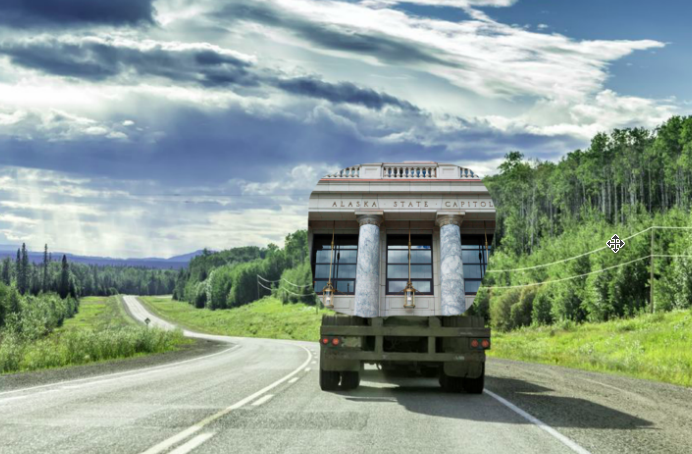By MICHAEL TAVOLIERO
A recent Juneau rental ad boasted a two-bedroom, one-bath apartment with high-end furnishing for $3,200 a month starting Jan. 1, 2022, through May 31, 2022.
Juneau rental owners know they have a captive audience and they’re working to get and keep top dollar.
The unreasonable reasoning and the unreal reality of a legislative session in Juneau is affecting both Republican and Democrat legislators’ wallets, stress levels, and blood pressure.
There are a couple of simple solutions to this problem: Either raise salaries and per diem or move the legislative session to Southcentral Alaska.
The first solution is being considered by the State Officers Compensation Commission on Jan. 4. The second is not being considered.
In 2021, a House bill was filed to move the legislative session to Southcentral Alaska, but it died in the House Finance Committee.
This has also prompted legislators to comment to the commission, which is currently considering ideas that will affect legislator salaries and per diem.
This financial dilemma is wrapped in irony because it is hurting both sides of the aisle.
For the most part, legislators’ comments have been that salaries and per diem are too low and need to be raised. When looking at the costs of moving yourself and any family to Juneau, this concern is legitimate. Historically, legislators have had to deal with Juneau’s rental market uncertainty, which can be costly.
The current salary for a state legislator is $50,400, with what appears to be excessive per diem under the rules that apply. Over the course of a regular 120-day session, this salary breaks down to $12,600, without per diem allowances.
This is also higher than the national average for legislators of $34,000.
The SOCC’s preliminary proposal is a salary of $74,500 and an annual expense cap of $5,000 per year. That is almost a 150% salary increase.
Under a 120-day session, this translated into $18,625 a month. Per diem would be spread over the session at $41.67 a day.
That’s a total compensation of $79,500 per year, which is significantly higher than the average total compensation for legislative members nationally. The median income of most Alaskans in 2019 dollars is $36,787 a year.
One legislator commented on the proposed changes, “Remember, not all special sessions are avoidable and many of them serve a much needed purpose, even if they tend to drag on.”
Seems like a reasonable point, but how can this be backed up?
The 2020 legislative session passed an operating budget. But when given the opportunity during the onset of Covid-19, Alaska’s greatest economic debacle, the Legislature did not help their constituents. The balances of the people’s 2016, 2017, 2018, 2019 and 2020 PFD’s, which was amended into the operating budget, were voted down by the majority of the 2019/2020 state legislature.
Covid-19 obliterated much of the small business private sector, destroyed our education capacities, and overburdened our health care system.
The 2021 legislative session had a regular session from January 19 – May 19, then 4 special sessions at the governor’s call: May 20 through June 18, June 23 through June 28, Aug. 16 through Sept. 14. Oct. 4 through Nov. 2. Except for the operating budget, not much was done, especially dealing with what is owed under the PFD, which never happened.
According to the Alaska Department of Revenue, the 2021 Legislature’s salary cost of $3,025,420 and $2,575,616 in per diem expenses provided an average of $93,350 per legislator.
For legislators whose permanent residence is not in Juneau, they receive up to $293 a day and no per diem. Legislators who must move to and from Juneau for regular session are entitled to be reimbursed for relocation expenses, in addition to per diem.
Some legislators believe their salaries need to be comparable with state employee salaries.
The average employee salary for the State of Alaska in 2019 was $66,963. There were 16,090 employee records in 2019 for Alaska — one state employee for every 45 Alaskans.
The average 2021 department commissioner salary was $145,000.
What other options are out there?
Like the Percent of Market Value for the Alaska Permanent Fund (the political football that effectively destroyed the simple manageable operation of issuing Permanent Fund dividends), the state Legislature has operated in the far and inaccessible reaches of Alaska’s capital city. They must be closer to the majority of the Alaskan people.
When 32 House Districts and 16 Senate Districts are all easily accessible to Southcentral Alaska, and 22 House Districts and 11 Senate Districts can drive to session and go home at night, the only solution is for the State Legislature and staff to meet in Southcentral Alaska.
In Southcentral Alaska, there are plenty of property options and a road system.
It is time to be move the session to Southcentral Alaska.
Remember, Alaskans voted twice to move the capital to save money and bring the Legislature closer to the majority of the people. Anchorage (over 40%) and Mat-Su (22%) represent over 60% of the state’s population.
Alaskans, when you vote in 2022, vote for candidates who are committed to this.
In the meantime, you do have an opportunity to provide your comments to the State Officers Compensation Commission.
On Jan. 4, the State Officers Compensation Commission will meet in Anchorage to receive public input on the question of Alaska legislators’ salaries and expenses. This is an important opportunity for the public to provide its comments on the changes considered.
The public may send their comments to Kate Sheehan, Division Director, at [email protected].
Michael Tavoliero is a realtor in Eagle River, is active in the Alaska Republican Party and until recently chaired Eaglexit.
